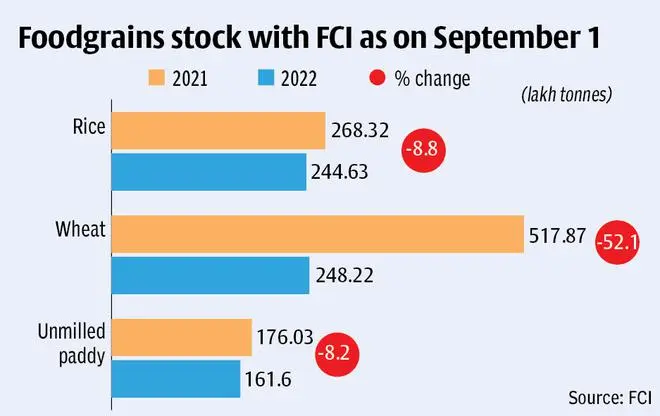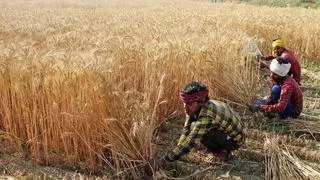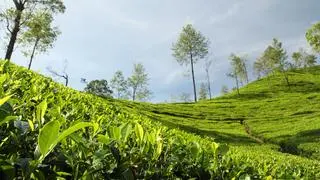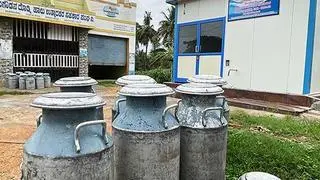Foodgrain stocks – rice, wheat and unmilled paddy - in the Central Pool managed by the Food Corporation of India (FCI) dropped by 33.5 per cent to 60.11 million tonnes (mt) as of September 1 from 90.41 mt a year ago. This lower stock will weigh on the Government’s decision in extending the supply of free rations under Pradhan Mantri Garib Kalyan Anna Yojana (PMGKAY) after September 30.
Latest data show that wheat stock has dipped 52.1 per cent to 24.82 mt and rice by 8.8 per cent to 24.46 mt from the levels seen a year ago. The unmilled paddy stock has slipped by 8.2 per cent to 16.16 mt (or 10.83 mt in terms of rice).
Stock requirement
The government needs 47.83 mt of rice and wheat to run the PMGKAY for a year at the current level of allocation and to continue for another six months (October-March), it needs to allocate 4.27 mt of wheat and 19.64 mt of rice. Procurement of kharif paddy will commence from October 1 for the 2022-23 marketing year and the government has targeted a purchase of 51.8 mt, higher from the last season’s actual purchase of 51 mt.
“In 2020, the rice stock was even lower than the current level (as on September 1) and the government decided to continue the PMGKAY in 2021 as there was a good harvest of the paddy crop leading to robust procurement. Besides, wheat procurement was also a record in 2021. But, not even half the wheat procurement target could not be achieved this year nor the rice production situation in rice production same now,” said an official source indicating the extension of PMGKAY may be unlikely after its expiry on September 30.
Rice, wheat output slip
Wheat procurement in 2022 dropped 56.6 per cent to 18.79 mt from last year against a target of 44.4 mt. This was since wheat production declined by 2.5 per cent to 106.84 mt following a heatwave across the country during March-April. The rice stock was at 22.2 mt as on September 1, 2020.
The government from September 9 banned the export of broken non-Basmati rice (except parboiled variety) and also imposed an export duty of 20 per cent on both non-basmati paddy and rice (except parboiled variety) amid fears of lower output. Soon after the ban, the Food Secretary initially said rice production may drop by 10-12 mt during the kharif season from 111.76 mt in the previous season. Later, the Food Ministry issued a statement mentioning three probabilities – fall by 6-7 mt or 4-5 mt, or maybe at par with the previous year.










Comments
Comments have to be in English, and in full sentences. They cannot be abusive or personal. Please abide by our community guidelines for posting your comments.
We have migrated to a new commenting platform. If you are already a registered user of TheHindu Businessline and logged in, you may continue to engage with our articles. If you do not have an account please register and login to post comments. Users can access their older comments by logging into their accounts on Vuukle.